Engaged Anthropology Grant: Stacey Vanderhurst
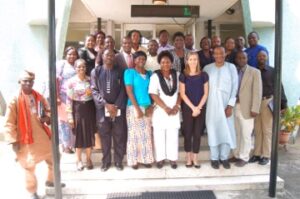
Stacey Vanderhurst is an Assistant Professor in the Department of Women, Gender & Sexuality Studies at The University of Kansas. In 2010 while a doctoral student at Brown University, she received a Dissertation Fieldwork Grant to aid research on ‘Victimizing Migration: Human Trafficking Prevention and Migration Management in Nigeria,’ supervised by Dr. Daniel Jordan Smith. In 2015 she received the Engaged Anthropology Grant to aid engaged activities on ‘Wanting to Be Trafficked?: A Workshop on Vulnerability in Nigeria,’ 2015, Nigeria.
On Wednesday August 5, Engaged Anthropology Grant awardee Stacey Vanderhurst hosted a full day workshop on human trafficking at the Nigerian Institute for International Affairs in Lagos, Nigeria. The workshop featured academic presentations by several local scholars in addition to a presentation of the grantee’s own research, and it was attended by over 30 participants representing a range of government, academic, and non-profit sectors across the region.
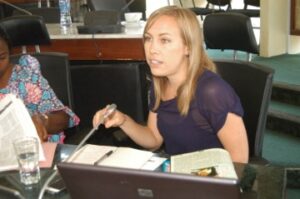
Vanderhurst’s original Wenner-Gren sponsored research demonstrates how local and international stakeholders overwhelmingly conflate human trafficking and migrant sex work in Nigeria and how, on the basis of this conflation, the Nigerian government routinely stops young migrant women from leaving the country. This workshop was therefore designed to examine how Nigerian women understand human trafficking, sex work, and high risk migration, and how those ideas can conflict with the local, national, and global intervention programs designed to help them.
Scholars and activists have documented similar contortions of anti-trafficking policy around the world. But while research on human trafficking has boomed in Nigeria, these critiques have been marginalized in the public discourse, in policy writing, and in academic publications. The goals of the workshop were threefold:
(1) To deepen understanding of human trafficking politics, especially from a migrants’ rights perspective
(2) To improve policy and programming related to human trafficking interventions
(3) To develop future collaborative research and publication opportunities
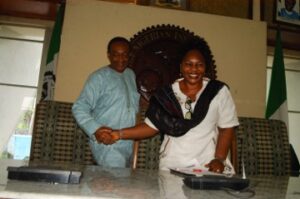
Prof. Franca Attoh of the University of Lagos chaired the session, drawing upon over ten years of research on these topics, including regular collaboration with the federal anti-trafficking agency NAPTIP. Prof. Clementina Osezua of Osun State University delivered a presentation on the history of trafficking discourses in Nigeria, and Prof. Oluwakemi Adesina of Obafemi Awolowo University discussed the changing gender roles and opportunities for women in the high-trafficking area of Benin City. Prof. Vanderhurst completed the session with a presentation of her research, tracing these social and historical trends into Nigeria’s modern anti-trafficking policies.
The NIIA rotunda space promoted open debate throughout the day, balancing time dedicated to formal presentations with roundtable discussion amongst all participants. They included a delegation from the Lagos Zonal Headquarters of the Nigerian federal anti-trafficking agency NAPTIP, who hosted the grantee’s original dissertation research.
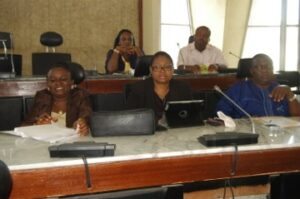
The Zonal Commander, Mr. Joseph Famakin, was an especially active interlocutor, regularly engaging critiques offered by presenters and audience members alike. Two representatives from the United States Consulate responsible for compiling national data in the State Department’s annual Trafficking in Persons Report made significant contributions to the discussion as well. Other participants included members of the anti-trafficking NGO network NACTAL and various research fellows from the NIIA.
Conversation was lively, productive, and direct. The presentations and discussant comments steadily challenged assumptions about women’s victimhood that often circulate in this community of experts. As Prof. Attoh provocatively claimed, “there are no victims in Benin.” Reactions to these presentations quickly revealed the wide range of understandings of human trafficking itself, from a sense of moral crisis around women’s prostitution to outrage at the plight of Nigerian migrants worldwide.
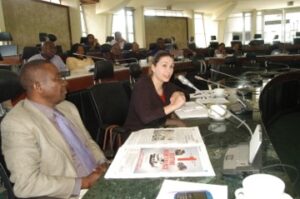
Challenges in aligning these different approaches to trafficking affirmed the urgency of the workshop objectives and pressed upon participants to advance these conversations further in both academic and policy forums.The workshop thereby concluded with a separate meeting for those interested in contributing to collaborative publication project, drawing out these differences. It was suggested that such an outlet for critical perspectives on human trafficking interventions is lacking not only in Nigeria but across the continent. Edited volumes based on other world regions have made significant contributions to the anti-trafficking work, but participants expressed a need to explore their implication in African contexts. Plans for a future meeting were discussed, and participants look forward to carrying on the exchange.